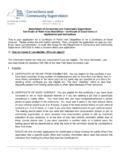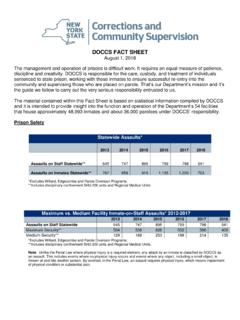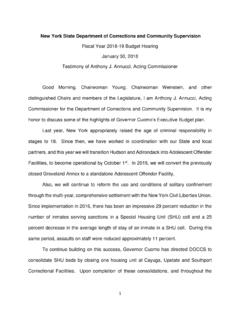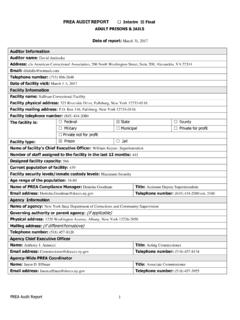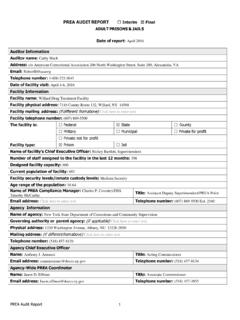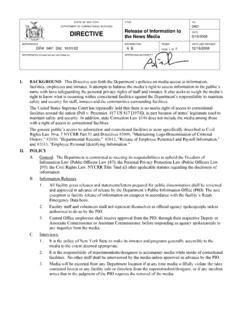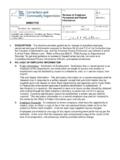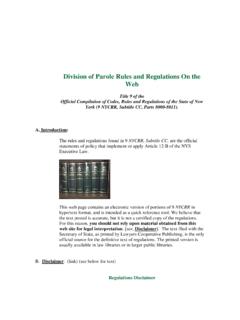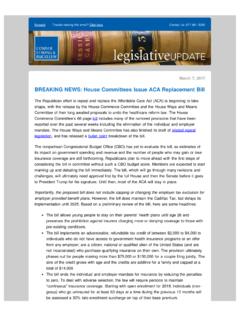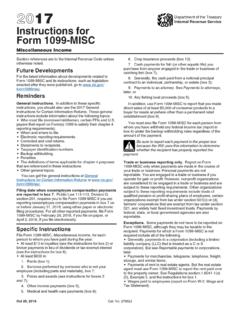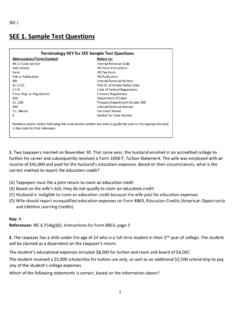Transcription of “COMING HOME” A Family's Guide to Reunification
1 COMING HOME . A Family's Guide to Reunification . NEW YORK STATE DEPARTMENT OF CORRECTIONAL SERVICES. BRIAN FISCHER. Commissioner ANDREA W. EVANS. Chairwoman and CEO of Parole INTRODUCTION. Your family member will soon be released from prison. The New York State Department of Correctional Services and the Division of Parole want to partner with you in making this transition as smooth and successful as possible. In this regard, we have developed a checklist of items that we think are crucial for you to review prior to the time that your family member returns home. 1. Support Services Research shows that persons who transition back into an informed and supportive family are less likely to re-offend and return to prison. There are a number of state and national organizations contained in the Department's Handbook for Families and Friends of Inmates that may be able to assist you with this transition period.
2 To access this booklet, you can visit the Department's website at and click on family Guide . Additionally, the public library is a great source for information as well as the Osborne Association family Resource Center Hotline @ 1-800-334-3314. Prison Families of New York is another good source for families. They can be reached @ (518) 453-6659. 2. Experiences During Imprisonment / Absence Both of you have lived through many different circumstances during the time your family member has been away in prison. It may take a long time to learn what it has really been like for each of you. Your loved one has led a very protected and structured existence within the confines of prison life, and may have difficulty adjusting to the responsibilities of everyday life on the outside.
3 Additionally, he or she may have had emotional experiences which they find difficult to talk about. 3. Loss of Communication Even during the best of times, on visits, and during telephone calls, communication may have been strained. Talking about feelings may have been avoided because it was too painful or difficult. Communication through letters and phone calls may have been restricted to urgent matters. Your family member may have avoided letting the family know about life in prison in order to prevent you from worrying. 4. Change of Roles You may have gained a greater sense of independence during your family member's period of imprisonment. You may have become responsible for matters which your family member used to handle. Please be patient and aware that the roles may be changing again.
4 5. Expectations You and your family member will each likely have your own expectations of what will happen once you both reunite. For example, both of you have hopes in terms of finding work, living arrangements, and for any relationships that were left behind. Life as you knew it is going to be different! Consider counseling prior to and after your family member's release. 6. Adjustment Your family member may have been away so long that they feel totally disoriented and out of touch with life in the community. For example, they may have become unfamiliar with how much things actually cost, or with getting around using public transportation. They may also have children who have grown up in their absence. The time spent apart from their children might mean that they feel distanced from them.
5 Additionally, your loved one may require time to let go of habits acquired while in prison, such as being up for the facility count, etc. 7. Parole The New York State Division of Parole is a different agency than the Department of Correctional Services. If your family member is required to be under Parole supervision, it is highly recommended that you establish a positive relationship with the assigned Parole Officer. Parole Officers have the responsibility to protect the community while assisting your family member's successful return to the community. Your cooperation with the Division of Parole can contribute to the successful re-entry of your family member. Consider the following few questions: Is your family member under Parole supervision? If so, when is their first report time?
6 (Usually within 24 hours of release). 9 Has a Parole Officer been to your house for verification of residence? 9 What are some of the conditions of Parole that are required of your family member? 9 Is any other member of your household under Parole supervision? (If so, this requires special approval). 9 Does your family member have a curfew? Please understand - the Division of Parole has the authority to visit your residence 24. hours a day to provide supervision to your family member. This may include searches of certain areas in your home and/or random drug testing of your family member. 9 Is your family member eligible for a Certificate of Relief from Disabilities or a Certificate of Good Conduct? These certificates may remove any mandatory legal bar or disability imposed as a result of conviction of the crime or crimes specified in the certificate.
7 Such certificates are granted through the Division of Parole. NYS Division of Parole: (518) 473-9400 or 8. family / Friends Have you discussed the news of your loved one's return to the household with family members? Are all the children involved aware of your loved one's return? Are they resentful or supportive? Does your family require access to support services due to issues involving domestic or family violence? You can reach the Domestic Violence Hotline at 1-800-942-6906. It is important that children be included in the process and have special time granted for them. You may have some anxiety about how things will work out when your family member begins to re-enter the community. It is a period of adjustment for your loved one and a natural occurrence to want to reunite with friends to catch up with everyone after being away for so long.
8 Please be patient so that you may be able to assist in this transition as much as possible. 9. Housing 9 Does your family member have housing? 9 Is there sufficient space for your loved one to reside with you? 9 Are you required to add your family member to your lease? 9 Is there an active Order of Protection from any member of your household against your loved one returning home? If you reside in public housing and the present offense of your family member occurred there, they may be prohibited from residing at that residence. This policy varies from county to county. Verify with your local housing authority for the regulations governing your area. 10. Financial 9 Is your family member entitled to benefits? (Veterans, Social Security Income, pension, Medicaid, etc.)
9 9 Do they have an active child support order for which they are responsible? 9 Is your family member responsible for restitution for the offense for which they have been committed? 9 With your family member's return to the household, are you and/or your family eligible for benefits; food stamps, Aid to Needy Families, The return of your family member back to the household will have an impact on the finances of the household. Expect increases in the cost of food, transportation, clothing, medical, and incidentals. 11. Employment Sometimes employers are not willing to hire someone who has been incarcerated. Be patient and have confidence that your family member will work. They can use your encouragement at this time. Does your family member have: 9 A prior work history?
10 9 A resume? 9 Does your family member have the necessary documents, including Social Security card, driver's license, birth certificate, and Veterans DD-214? 12. Legal Does your family member have any of the following? 9 Immigration issues? 9 Outstanding warrants? 9 Outstanding motor vehicle tickets/fines? 9 Requirement to register as a sex offender? It is recommended that these issues be addressed with the assigned Parole Officer to determine what should be done. 13. Release Day/Parole The time has arrived for your family member to be reunited with family members and to be back in society. Anxiety is to be expected for all parties involved. There is a great deal of planning that is involved with releasing people who have served time in a correctional facility. Several departments are involved, including, Parole, the Inmate Records Coordinator, Medical, and the Office of Mental Health, to name a few.
